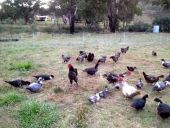This is a badge bit (
BB) that is part of the
PEP curriculum. Completing this BB is part of getting the
straw badge in
Animal Care.
For this BB, you will prove that your
bees do not have parasites in the spring, summer, and fall.
 (source: Pinterest.com)
(source: Pinterest.com)
For this BB, the minimum requirements are:
- prove that your
bees do not have parasites in the spring, summer, and fall
To document your completion, provide proof of the following as pics or
video (less than two minutes):
- parasite testing in the spring
- parasite testing in the summer
- parasite testing in the fall









